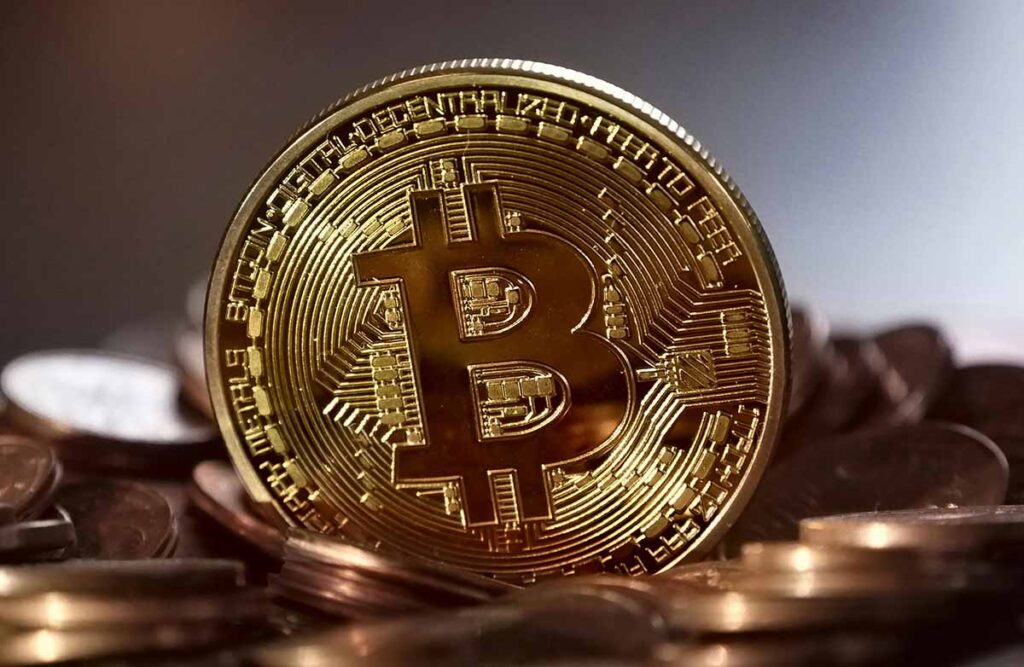
Never invest in any idea you can’t illustrate with a crayon.”
– Peter Lynch, American investor, mutual fund manager, and philanthropist. (1944 – )
As global stock markets reach new highs, a market receiving similar attention is that of cryptocurrencies, the most prominent of which is Bitcoin. Cryptocurrencies have made millionaires of many early holders and “miners” of this digital money, having exhibited valuation growth rates that are astounding. Within the past two years, Bitcoin has appreciated over 2,600 percent.
Interest in cryptocurrencies has risen as these outstanding gains are reported by the press and on social media. The recent introduction of Bitcoin futures and the filing for 23 new exchange traded funds (ETFs) based on cryptocurrencies and blockchain technology indicates that there is some interest on Wall Street in this novel monetary system.
Cryptocurrencies are the current Wild West of the investment world – move over, marijuana stocks – and not for the risk-averse. After achieving a peak price of over $19,000, Bitcoin dropped 35 percent within two weeks. As I write this, it is below $12,000. A speculator might see this as a “buy on the dip” opportunity. Others view it as a reason to “leave skid marks.” Before your twenty-something child convinces you to take a flyer on a cryptocurrency, let’s examine this monetary mystery that has already reached a market valuation of $564 billion (!) and captured the imagination, as well as the capital, of millions of owners.
Blockchains and cryptos and mining, oh my!
To understand cryptocurrency, you need to start with the underlying technology, the blockchain, that makes it possible. A blockchain is a network of distributed ledgers – think spreadsheets – which all contain identical information about every transaction that has ever occurred on that blockchain network. When a transaction occurs, such as the purchase of a Bitcoin, the details of the transaction are broadcast to every network participant (called “nodes”). Thus, for the Bitcoin blockchain, all nodes have an identical record of every Bitcoin transaction, and of which accounts own specific Bitcoins. It’s like an open-air market where all vendors are selling the same item, and each time a purchase occurs, the seller yells out the details of the sale to everyone present at the market, who all simultaneously record it. No secret deals in this marketplace.
Each cryptocurrency has its own unique blockchain network. To purchase a Bitcoin, you need to have an encrypted digital “wallet” linked to an exchange that does Bitcoin trades. You obtain a unique secret key, which can be validated by all the nodes on the network to ensure your legitimacy. The trades can be in dollars, yen, euros, or even other cryptocurrencies. When you and a seller agree on a price, a transaction takes place: you transfer cash or other coins into the seller’s account, they validate the transfer, and then send the Bitcoin to your digital wallet.
Bitcoins are created by a process called “mining,” which provides compensation in Bitcoins for those who provide computing services to the Bitcoin blockchain network. Their number is capped at approximately 21 million to limit supply. If you’ve followed this description thus far, you deserve a gold star and get to clap the erasers after class.
A collectible you can’t touch or see
You’re probably wondering how Bitcoins are ascribed a valuation. It’s simple supply and demand, the same as a stock, a bond, or a Picasso painting. There is a finite supply of Bitcoins in existence, and when a Bitcoin is purchased, that becomes the current price until the next transaction takes place, like trades on a stock exchange. However, this exchange is distributed across the Internet, and no one entity manages it. It is total free market trading.
I view a Bitcoin as like a work of art that you can’t hang on your wall to admire. A rare painting doesn’t produce any income, and its supply is limited. Its owner assumes (hopes?) that growing demand for the painting over time will increase its value to other art collectors. Plus, he or she can look at it. A bitcoin only exists in a digital wallet and recorded on multiple distributed ledgers. It has no utilitarian value, like precious metals do. Its value is based purely upon artificial scarcity and demand, and what someone else is willing to pay to own it.
Caution is warranted
Cryptocurrency proponents insist that it represents a radical paradigm shift in how monetary value is exchanged, and is a legitimate new form of currency. Digital currencies aren’t controlled by any government, company, or centralized entity, which is touted by supporters as its major advantage. That is also its greatest weakness. If there is a security breach at a bank, and my account is emptied, I have recourse with the bank to make good on my losses. If I buy a counterfeit painting at a gallery or auction, I can seek a remedy with the owners of those businesses. Where can I go if my Bitcoins are stolen because someone hacked my private key, or if the blockchain of a cryptocurrency ceases to exist? Nowhere. You’re on your own.
Similarly, a government’s central bank has some control, and thus responsibility, for the value of the country’s currency through its management (or mismanagement) of interest rates and monetary supply. No such entity exists for Bitcoin, and thus there is no accountability nor culpability if something goes wrong.
The SEC and the IRS are already examining cryptocurrencies for legal compliance with US securities and tax laws. Two weeks ago, Bitcoin fell 20 percent after a major China exchange announced that it was closing following the increased regulation of cryptocurrencies in China. Some Wall Street firm have begun to offer trading in digital currencies, but this is as close as they have come to endorsing the concept. Many well-known investment figures have voiced their skepticism about cryptocurrencies, and the chorus seems to grow daily.
We’ve seen this movie before
I have no doubt that blockchain will prove to be a useful technology. Vanguard is already looking at it as a means of updating financial index data upon which many of their funds are based. I suspect that existing business models will be upended by eliminating the need for a central transaction entity, and many new businesses will be created.
But cryptocurrencies have too many unknowns and risks to call them an investment. Today they are a speculation, with no way to determine their future value. Do you need a “crisis hedge”? Stick with gold. It has acted as a currency for over 6,000 years, is scarce, and you can hold it in your hand.
Recall the profitless dot-coms, Beanie Babies, and Dutch tulip bulbs. Bitcoin sounds like yet another episode of the “Greater Fool Theory,” and we already know how that show ends.
